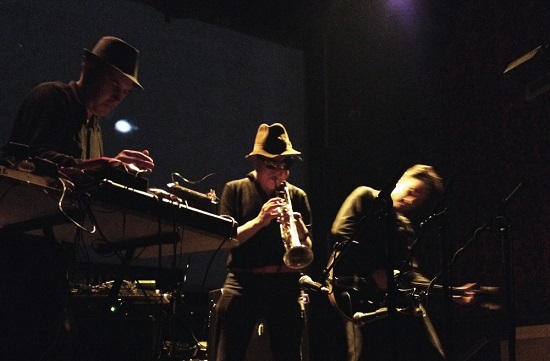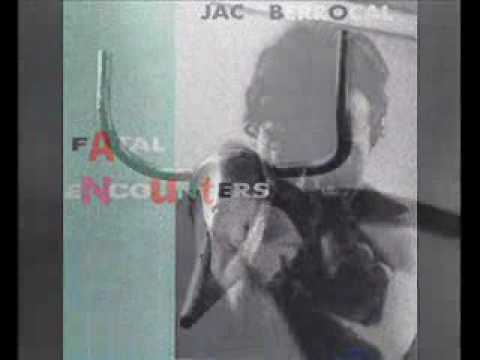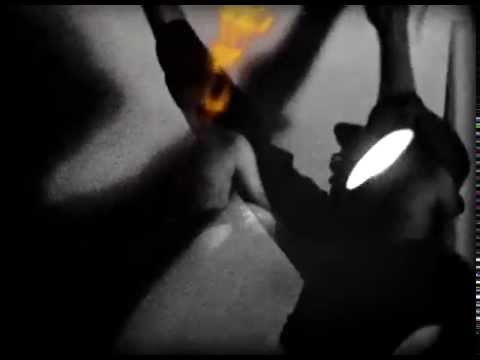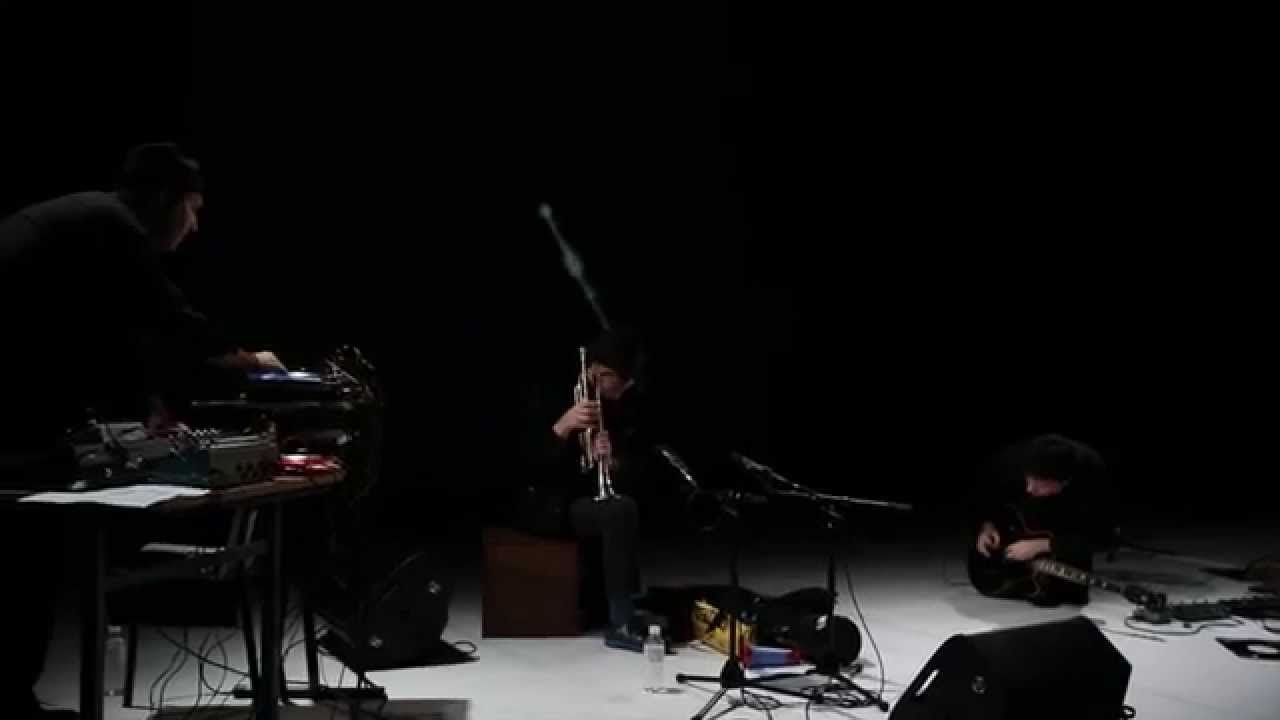Normally I would consider it my role to make interviewees feel as comfortable as possible from the beginning of the conversation, but the trio of Jac Berrocal, David Fenech and Vincent Epplay, gathered in a room at Fenech’s place for a Skype conversation, have taken it upon themselves to devise a disarmingly cheerful welcome. Seated to the left, Fenech wears sunglasses and waves a fluffy white teddy bear at me (it belongs to his daughter Anouk), to the right Berrocal, not to be outdone, has opted for sunglasses, a black fedora and broad-collared overcoat, and clutches a baby doll to his chest as he takes a seat. Epplay sits between them, cheerfully puffing on an e-cigarette. Behind them is an array of stringed instruments, a guitar amp, shelves packed tight with vinyl.
It’s an instant reminder that while I’m talking to them about an album of ‘serious’ music, Anti-Gravity – steeped in improv, garlanded with shadows, finding a natural home on Blackest Ever Black – it’s not that heavy either. There’s a plenty of breathing space in the mix, ideas skip by, never once over-elaborated, while absurdist humour and even a degree of jauntiness cut through. Originals are interspersed with re-appropriations of jazzy themes spun from Berrocal’s vocabulary as a trumpet player – Gil Evans, Michel Legrand – although ‘The Overload’, while discarding everything else, retains the lyrics and dread mood of the Talking Heads’ song.
Speaking of improv, there’s a lot to be said for the quality of the interplay throughout the interview. This is particularly the case when Berrocal starts spinning what you sense is well-worn tale and before long they’re all – Berrocal included – riffing on, or even gently skewering, the initial theme.
Berrocal is the most seasoned of the three – a crucial figure in the post ’68 French underground, he released a debut album with Roger Ferlet and Dominique Coster, Musiq Musik, in 1973, following travels with Ferlet that had taken him to, amongst other places, Nepal. During the interview, Berrocal describes Tibetan ritual music by mimicking each instrument in a quite extraordinary fashion.
Collaborations since have included Pascal Comelade, James Chance, Jaki Liebezeit, Ghédalia Tazartès and Pierre Bastien, who played double bass on the enduring ‘Rock N Roll Sation’, which famously features spoken word vocals from Vince Taylor and was later covered by Nurse With Wound – and again by Berrocal/Fenech/Epplay on Anti-Gravity.
Fenech and Epplay are hardly slouches though. The former founded an improv collective, Peu Importe, that released two albums in 1996, before releasing his solo debut, Grand Huit, in 2000, and has previously already featured in a trio with Berrocal and Tazartès. Epplay, who is also responsible for the visual aspect of the Anti-Gravity project, including the sleeve and the live visuals, is a well-established sound and visual artist. He takes up the story of the group’s inception.
Vincent Epplay: Jac and David had already been making music together for two or three years, primarily with Ghédalia Tazartès. I’m a visual artist as well and was involved in an exhibition at the Villa Arson in Nice. I was presenting a theatre piece that involved films and recordings, and Jac was a character who appeared in one of the films, a film from 1987. Every artist involved in the exhibition was also asked to make musical selections and invite groups, so for me it was obvious that I should invite Jac and David to play. Very generously, they invited me to play with them on a couple of songs…
David Fenech: We started the concert as a duo and we finished as a trio with Vincent.
Jac Berrocal: It was a triumph!
DF: We fell in love…
VE: The point is it began like that in a rather fortuitous way… and we went on to play a concert together in Berlin very soon afterwards.
DF: So it’s been a about three or four years.
JB: We started doing some stuff in David’s studio, and in Vincent’s studio, to prepare for concerts but we had some recording sessions too, and it became Anti-Gravity.
It makes sense as a title – there’s a lightness of touch, there’s lots of space, it’s quite playful in many ways.
VE: It was recorded over a period of three years in the form of various sessions, we recorded a lot of things and afterwards there was a lot of mixing, some re-recording, voices that were added, it’s not just the raw sound of the sessions, there was a real job of recording, mixing, producing – that was the part that was really me and David but it’s a real collaboration between the three of us.
DF: To come back to the title, I came across the word reading an interview with Moondog, who was saying that there are places in the world where one feels as though one is freeing oneself from gravity’s pull, which have a mystical quality like the Broceliande forest in Brittany for example, where you don’t feel the weight of the earth any more. And I was thinking that that’s what I wanted for our music, to leave behind the weight of everyday life, of gravity, and very pretentiously I thought we could call the record by that name. Because we had a desire to float… if the music can achieve that, that’s great.
JB It’s an attempt!
This point about various places in the world, I wondered about your relationship to world music – you mention various places names, and there are sounds which might be identifiable from different countries, as if it’s a sort of imaginary trip around the world.
JB: Well, David, Vincent and I, although we haven’t necessarily been to the same places we’ve all travelled quite a bit and more or less unconsciously you bring back in your belly, in your head, various sounds and atmospheres that often, quite naturally, we reconstitute in our own way – it can sound oriental, or Japanese, or Chinese or German. Journeys are very important, I started travelling when I was pretty young but I didn’t have tape recorder or a camera, I always said that my camera was my eyes and that my tape recorder was my stomach. So everything I’ve heard in other countries, I hold on to it in my memories, the memory of my intestines, of my belly, of my eyes and my brain. I think it’s the same for David and Vincent. So I would say that very naturally we found ourselves making music that I guess is a kind of world music and it’s a great compliment…
VE: But we never spoke about it…
JB: Yes it was spontaneous, we didn’t really talk about our travels in relation to the music. But there have been journeys to the four corners of the planet – David, among other places, has been to Bali, Syria, Iraq… Vincent has been to Belgium! [LAUGHS]
Jac, before making your first album you’d been on some pretty interesting journeys…
JB: Yes, with my friend Roger Ferlet we went on a big escapade to Pakistan and Nepal, and then Syria, Iraq and Jordan, and at the same time we met people living in terrible poverty, people engaged in struggles, Tibetan culture, Tibet where people are still suffering under the same conditions. In Lebanon I met Palestinians in the camps, in the north of Baghdad we met Kurds who were also living in great poverty, so all that feeds into it. I believe you’re talking about Musiq Musik, that’s music from a journey, music based on travelling. It’s a record that was greatly influenced by the journeys we went on. Especially because we brought back instruments we found along the way, from Syria, Iraq and India.
VE: This was before World music.
JB: It’s the first World music album! [LAUGHS] Everyone else has been trying to catch up!
But it’s not really music in a particular style or idiom, more memories or impressions of a place.
VE: Yes, it’s like reminiscences of certain sounds – but what I didn’t say was that we never set out to try and make an ‘orientalist’ record or anything like that, we’re not really interested in that sort of approach. They are just things which are in each of us, based on separate experiences we’ve had.
DF: If you look at the room behind us you can see a gamelan that was used on ‘Tsouking Chant Kinsu’, but we don’t play gamelan like a Javanese gamelan orchestra would, nothing like it. Jac plays a Tibetan horn. We use the instruments but not in the idiom or the style that they’re used traditionally, it’s really for their sound. And Jac played the kangling, maybe you can explain what that is Jac?
JB: We’re already on to the kangling! Yes the kangling is a Tibetan trumpet of sorts made from a human femur used by the orchestras of monks in the lamaseries during religious ceremonies. We don’t really use it like the Tibetan monks, we use it in our own way. What’s interesting with this type of instrument is that the western instruments have to adapt to it, they’ve got a raw sound, it’s not tuned. Same with the gamelan, the other instrumentation has to find a way to accompany it.

Is that easier anyway when you’re using electronic sounds?
VE: The electronic aspect is a bit my area, I play particular synthesiser, a ribbon synthesizer which is similar which is similar to the ondes Martenot, it’s modelled very much on the earliest synthesizers. It’s not like a modular synth with lots of patches, it’s very simple and intuitive in the way you play it. It’s true that with electronic sounds you’re not necessarily thinking about creating melodies, it’s the textures and things like that you’re after.
JB: But melodies are everywhere, everything’s melodic, even in places where you expect them the least.
DF: Yes, in drum parts…
You’ve talked a bit about this but can you explain how the roles were divided up?
DF: I recorded and played guitar, I sing on a few tracks. Jac is trumpet, voice, human femur, sea shells, noises and sometimes percussion and Vincent is the electronic side, synths, recording when we’re recording at his place, as well as noises and percussion and sounds added afterwards. So we like starting with a recording, that can last 10 or 15 minutes, from which we take the essential, the most interesting part – that’s why the tracks can seem short, because we’ve really reduced them down, like a reduction in the kitchen – but we don’t really have a golden rule. It can be a live recording at two in the morning that’s magical and we say, “Right, we’re keeping that, it’s on the record” – the first track of side two of Anti-Gravity was like that – or it can be lots of layers, one on top of the other, we record more and then we edit until we have the track, and then it can take six months to have the final track – or rather the track is completed over a period of six months.
VE: This way of doing things, you risk losing the coherence, or a narrative thread, but keeping this kind of spontaneity helps, and also we did a lot of sorting through the recordings we’ve made to choose the 13 tracks – a lot of time listening, discussing, to be sure of agreeing on the right selection, to make something that was listenable to from beginning to end.
Were the improvisations very open?
VE: Well there’s one thing that’s very particular to Jac, which is that when he plays the trumpet he’s sometimes playing things, without any prior warning, maybe standards from Coltrane or it could be something like ‘La Valse Des Lilas’ by Michel Legrand, they’re not really things I listen to, it’s repertoire that’s connected to a certain period and a certain style of music, and I think that they’re tunes you have in your instrument, Jac…
DF: And when we play them live, we never play them the same way twice. Our version of ‘Overload’ bears almost no relation to the original, but it’s a starting point.
Do you know the story behind ‘The Overload’, that was it was what Talking Heads thought Joy Division sounded like, without ever having heard them?
DF: No – in that case ours is more like Joy Division!
Speaking of standards, ‘Rock N Roll Station’ is almost a standard in itself now, why did you decide to have it on the album?
JB: Because they forced me – they said, “If we don’t do this, you can’t play with us anymore!”
DF: You could have a whole album just with versions of ‘Rock N Roll Station’!
JB: What’s different with this song is the actual sonic presence of the original Ziggy Stardust… the ghostly presence of Vince Taylor on the track.
There’s a recording of someone talking about Vince Taylor at the end…
VE: It’s Vince, talking about himself in the third person! What I can say is that it’s the first track I heard by Jac Berrocal.
The visual aspect of the project is important to you as well.
VE: I don’t separate out music and images, for me it’s the same thing…
JB: And when we play live we play with Vincent’s films.
VE: But it’s not just the idea of having a film projected behind us, like a kind of support, they’re more like apparitions which function as our stage lighting in a way, they’re more like projections in the sense that they project light. But I work hard to make sure that they’re not images that lead to particular interpretations of the music. It’s a partner, and element, there are elements that appear and disappear, but it’s not too illustrative. It’s more of the order of an amplification, amplifying certain phenomena. Jac is a protagonist, he appears as one of the characters, or a ghostly image.
The ghostly seems to interest you.
ME: It’s a word – “fantome” -that you hear at the end of the record.
Even the sleeve for me is kind of ghostly.
VE: It’s linked to the films too, without us having that in mind initially. But certain of the tracks definitely provoke mental images, cinematic images.
We also hear the words “Ca ne s’explique pas’ (it is inexplicable) on the record. It that linked to music, something in it that can’t be explained?
JB: Partly, certainly with music you shouldn’t over-analyse but I’m using it in a poetic context. I was in Latvia and when I saw Riga Central Station the words came to me almost immediately. It’s a station built in the 40s, decrepit, full of fissures, in a terrible state but which is nevertheless still standing, and which has known a number of turbulent historical moments, and after walking through this station I went straight to the hotel and wrote this brief text called ‘Riga Centraal’. So it was the station that gave me this idea, and then I thought about aurocarias – there aren’t really any in Latvia because it’s not really a warm country – and hotels, old decrepit palaces I’ve visited where nothing works and there are leaks everywhere. When I was in Lebanon I was lucky enough to stay in Jean Marais and Jean Cocteau’s room, at the Palmyra hotel – there was no air conditioning, nothing worked, but Romy Schneider, Agatha Christie and a whole host of people had stayed there. It was an association of ideas, which is not to say that the text is meaningless, it’s just ‘inexplicable’.
Coming back to the sounds on the album, it opens simply with just spring reverb…
DF: Yes, that’s right. It was recorded live during a concert in Bordeaux, so you start the record with a live sound that then it changes very quickly into studio sound. I see it like a character approaching [he makes footstep sounds].
VE: It was also quite a particular concert, commemorating an important festival in France, Sigma, that Jac played at for example, for the avant-garde of the 60s and 70s, and we were invited to play as part of the exhibition telling the story of the festival. It was a place with lots of warehouses, in a space that’s really a cathedral, and this kind of space allows us to record things we wouldn’t be able to capture normally.
DF: And the microphone was at the back of the cathedral, so there’s a lot of reverb.
David and Vincent, that 60s-70s avant-garde, were you aware of it when you were starting out making music?
DF: Well, my neighbour was the boss of a label called Celluloid [founded by Jean Georgakarakos] – Alan Vega, Soft Cell, but also Ghédalia Tazartès, Manu Dibango, Touré Kunda, and I was at school with his son so I already had access to all that without realising it was underground or unknown or anything like that because it was my friend who gave me the records. I discovered Ilitch more recently, Patrick Vian – it was a very fertile scene, you can’t be aware of everything. Let alone in our own era. And obviously I listened to Jac.
VE: For me it was the 80s, I was working with another musician who had an unbelievable record collection and introduced me to things including Jac’s records and all this French scene – Video Adventures, Lard Free, Catalogue (founded by Berrocal) around ‘83. And then I met this friend again, Pascal Bussy, of the Tago Mago label (now Harmonia Mundi), who gave me quite a few cassettes including a famous compilation Paris-Tokyo. It was a small scene but, even without internet, things circulated, people were aware of these things. It was a really small network in France but it reached certain people and, in Paris, for me at least it took on new life in the 90s.
Jac, you don’t really seem to have had any trouble adapting to new eras, through punk and after.
JB: I’ve find myself being invited to participate in all kinds of projects, rock, jazz – and poetry which is important too, so I’ve worked thanks to poets like Jacques Doyen (and other people like Lizzy Mercier-Descloux, with free jazz orchestras, music that was radical at the time, and rock but of the more deviant, punky kind like MKB, Catalogue. It was experimental rock.
DF: Rock-not-rock.
JB: Yes, ‘rock’ doesn’t really mean much in itself, because ‘rock & roll’ is Vince Taylor, Gene Vincent, those people, Elvis obviously. But in rock, as in jazz, there’s a palette which is fairly broad and I was always on that side of people doing free jazz and things like that.
Free jazz was a key influence for the post-68 French artists.
JB: I encountered free jazz right at the beginning, thanks to a great radio Europe 1, a commercial radio station, which still exists and which in ‘61 and ‘62 was playing Ornette Coleman and Don Cherry at lunchtime. I’d always liked jazz because my father was a fan of traditional jazz, Duke Ellington, Count Basie, and a little bit of bebop, and I fell straight into free jazz and also modern jazz – Charlie Parker, Art Blakey, Miles Davis and then Coltrane, Albert Ayler, Ornette Coleman and all those people. So my influences were free jazz and then rock – it was weird actually because I’d been in a rock band when I was 15 near Paris were we sang in ‘yaourt’ (yoghurt: singing sounds that approximate real words) kind of ‘wenzzanoyeah’. And I should have carried on because for the girls it was interesting…
DF: It was ‘free’ yoghurt!
[At this point Jac makes a joke based on the fact that the word ‘fruit’ in French sounds almost the same as ‘free’…]
JB: Yes I made fruit yoghurt! Which is to say that nobody could speak English but everybody wanted to sing in English. Which was interesting although really it was shameful.
DF: In sound poetry it might wash!
JB: So it’s this mix of music. I also love the music of the renaissance because I started with that when I was 10. To avoid maths lessons, I volunteered for the masses at a Carmelite nunnery and there I heard Gregorian chants in Latin sung by women, which was fantastic. I was lucky enough to hear that music in a church, with a big organ and a choir. I also participated in a polyphonic choir in the 50s, we did concerts and we were invited for important masses – we buried an archbishop in the cathedral of Sens, one of the largest gothic cathedrals in the world. After the mass lots of young girls and their mothers offered us cakes. And it was surprising because we were there, the little singers, next to the coffin, and I immediately saw that we were the stars!






